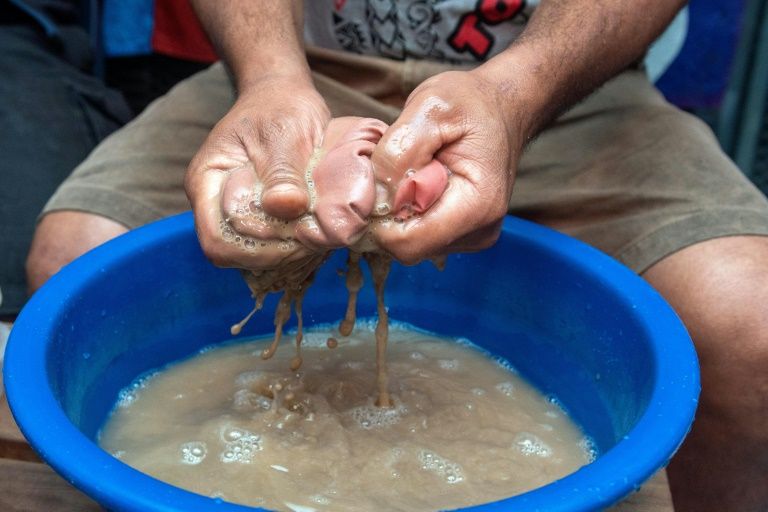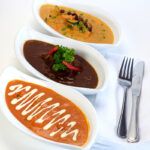Fiji’s kava culture adapts to virus challenge
Suva (Fiji) (AFP) – Once the preserve of men and consumed in ritualistic ceremonies by villagers and chiefs alike, Fijian traditional drink kava is attracting a new market as coronavirus restrictions prompt more women to sample the mildly narcotic brew.
Kava, known in Fiji as yaqona, is an essential part of South Pacific culture, used throughout the region for relaxation and stress relief.
The root of the kava plant is ground, mixed with water and then strained to produce a gritty grey liquid. First-time users sometimes liken the taste to muddy water but the drink’s effect is undeniable, a mild numbing of the mouth and a general feeling of calmness.
“We drink it because our grandfathers drank it, our great-grandfathers drank it,” said Kaiava Davui, a gardener who regularly has kava on the weekends.
“We talk, share ideas. It takes away stresses.”
It is ubiquitous in all layers of Fijian society — visiting dignitaries such as Britain’s Prince Harry sup at ceremonies alongside chiefs, while in rural villages groups of men can often be seen gathered around a bowl of “grog”.
But for the most part it has been a custom for men only.
Now, most of the traditional, male-dominated kava ceremonies have been curtailed because of the coronavirus pandemic.
They typically go into the early hours but Fiji is currently under a 11pm-4am curfew, as it seeks to continue its success in preventing community transmission of the virus and keeping active cases down to single figures.
To minimise the risk of transmission, there was also a temporary ban on sharing the bilo, the communal cup from which the kava is sipped.
But the restrictions have encouraged new methods of imbibing — and brought new consumers to the drink.
– Hipster favourite –
Kava bars — inspired by outlets in the United States, where some hipsters have turned to kava as a soothing substitute to booze — have popped up in Fiji.
Weta Coffee, in the capital Suva, features a kava bar at one of its cafés, offering bowls of instant kava made from a powder that readily mixes with water.
Weta director Mue Bentley-Fisher said the bars offered an alternative to the masculine culture around kava in Fiji.
“Groups of young women are coming in. They feel safe drinking kava here,” she said.
At Mauri Kava Dealers, owner Keti Suli Hannah Balenacagi said the beverage was an important part of her social circle’s gatherings.
“To me, kava is something that I do when I’m so stressed, I need to relax or I”m socialising with my friends,” she told AFP.
“It just helps me to relax and to enjoy the moment with my friends.”
At Westa, each person gets his or her own bilo, instead of sharing the cup. The cafe closes at 9pm, well before curfew.
Bentley-Fisher said her business launched just before lockdown in March and kava sales initially fell, but recovered strongly.
“We’re exceeding opening levels,” she said.
“We’ve seen that there’s higher demand for kava from Wednesday through Friday, with all sorts of customers choosing kava as an alternative to alcohol and to unwind at the end of the week.”
Uncertainties in the domestic market because of the pandemic have also seen growers accelerate moves to establish kava as a “wellness” product in overseas markets.
Fiji Kava, which has its headquarters in Australia but grows its product in Fiji, has established a scientifically accredited laboratory to develop a premium variety of kava for export.
– ‘Rest and relaxation’ –
The firm has developed capsules for global consumers seeking anxiety relief and is partnering with the Fiji Rugby Union to promote the benefits of the product.
Fiji Rugby Union chief executive John O’Connor said kava helped players cope with the “significant physical and mental challenges” of playing elite sport.
“We have found an ideal partner to provide our teams with safe, premium-quality kava supplements and relaxation tablets which will assist them with muscle relaxation, restful sleep and recovery,” he said when the deal was announced in March.
Kava users say the drink, particularly the cheaper varieties, can cause a hangover, and the UN Food and Agriculture Organisation says excessive use can lead to skin rashes, nausea and indigestion.
The UN notes concerns it can cause long term liver damage but says the limited studies on the subject do not back that up.
The most recent available figures show that in 2018 Fiji exported about 160 tonnes (176 tons) of kava to the United States and 80 tonnes to New Zealand
Australia currently allows in a limited amount of kava for medicinal use, but last year announced it will trial commercial imports.
The nation is seen as a huge potential market, but the pandemic has forced the trial to be postponed until next year.
Despite this, Fiji-based Green Gold Kava said its export volumes remained strong.
Company owner Praveen Narayan is so confident about kava’s appeal in a world gripped with virus-induced anxiety that he has commissioned a new manufacturing facility and is expanding his product line to include kava-infused fruit drinks.
“The future is bright,” he told AFP. “Kava is going to become big.”
Disclaimer: Validity of the above story is for 7 Days from original date of publishing. Source: AFP.


